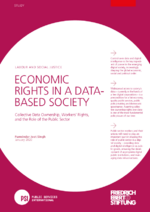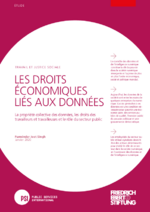What if the citizens of Berlin owned Uber’s data?
In the digital economy, having control over data equals power. Rather than letting digital companies own the data they collect about us, Parminder Jeet Singh argues that we should establish a collective economic right over data.
Every day, companies like Uber, Amazon or Google collect data of users of their services. Every Uber driver - who uses public roads, public traffic lights and parking space - collects data of traffic flows of the city. The company, Uber, appropriates this data. Neither the driver nor the customer are compensated. Nor has the company any obligation to share this data with city planners or the public. Rather, the company has a wealth of information in its private hands that the public may need to pay for it wants access.
We see many private companies obtaining data and transferring them into digital intelligence in many sectors. And we have understood by now how control over data puts private companies in a powerful position vis-à-vis the public interest. But what if we need that data for city planning and optimizing traffic flows? For preventing a pandemic spread or ensuring fair distribution of a new vaccine? We should not have to be paying private companies for data we generated and are about us, no matter if it was obtained with or without our explicit consent.
To avoid a future in which private dominates over public interest, Parminder Jeet Singh introduces the notion of »collective economic rights over data.« This means that data that is from and about us should be shared, for example if the city needs it for planning urban infrastructure (new bike lanes or bus lines) or in other cases of public interest.
Failure to establish collective rights over community data will make it impossible to democratically plan and implement the public services and infrastructure we need. To stay in the example, the choice is: a smart city conceived by and for private interest, or a smart social city that belongs and caters for the needs of all citizens?
Parminder deepens these ideas in his paper»Economic rights in a data-based society«, which was presented and discussed in a FES web seminar on Tuesday, 19 May 2020.
About the Author
Parminder Jeet Singh is Executive Director of IT for Change. His engagements have been in the area of ICTs for develop-ment, Internet governance, e-governance, and digital econo-my. He has been a special advisor to the UN’s Internet Governance Forum (IGF) and to the UN Global Alliance for ICTs for Development. He has been a co-coordinator of the global Civil Society Internet Governance Caucus, and is a founding member of Just Net Coalition.
Singh, Parminder Jeet
Economic rights in a data-based society
Berlin, 2020
Download (PDF) (280 KB, PDF-File)


